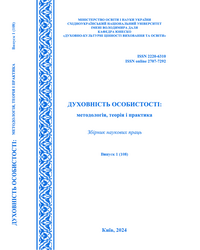THE ACMEOLOGICAL APPROACH TO THE FORMATION OF PROFESSIONAL CULTURE OF FUTURE MANAGERS: THEORETICAL AND METHODOLOGICAL FOUNDATIONS
DOI:
https://doi.org/10.33216/2220-6310/2024-109-2-235-245Keywords:
acmeological approach, professional training, educational process, future managers, theoretical and methodological foundations, acmeological technologiesAbstract
The article has focused on the necessity of forming professional culture in future managers during their professional training at higher educational institutions. We have considered the professional culture of a future manager as an integral system that includes professional values, elements of professional consciousness and professional behavior and acts as a significant factor that encourages the personal development of a specialist as a subject of activity and has been manifested in life and professional self-determination, morality and spirituality. A future manager with a high level of professional culture will be a successful specialist who will effectively implement all managerial functions and solve complex professional tasks, as well as quickly adapt to the difficult conditions of professional activity both in peacetime and wartime.
The acmeological approach is focused on the holistic and comprehensive development of educational systems and the personal and professional development of students as the main subjects of the educational process; it is a synthesis of systemic, personality-oriented and activity-based approaches. In theoretical terms, this approach provides a clear analysis of the mechanisms of acme formation, taking into account personality, and allows to identify the various connections that exist in the educational process and bring them into a single holistic picture during the formation of professional culture. Using the acmeological approach in our research, we draw attention to the following three main methodological aspects that it provides: 1) predicting a qualitative result in the professional training of a future manager who has an appropriate level of professional culture; 2) a holistic study of the factors that influence the productivity of future managers’ training; 3) building an effective model of the acmeological educational process aimed at forming an appropriate level of professional culture in students of the specialty 073 Management, taking into account all the factors that influence this process. The author of the article has analyzed the methodological requirements that we followed during the formation of professional culture in future managers based on the acmeological approach, and also revealed the problematic aspects that will be solved with its help.

